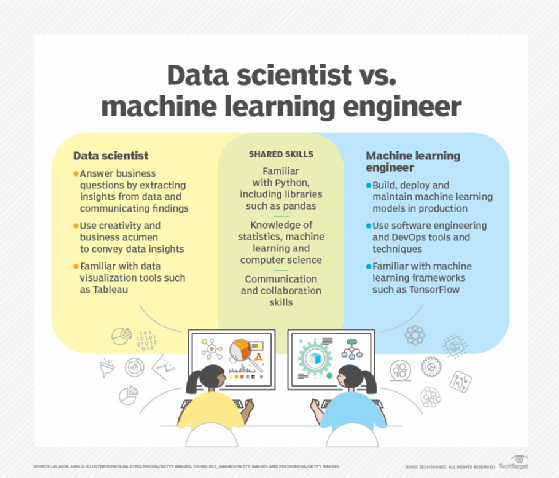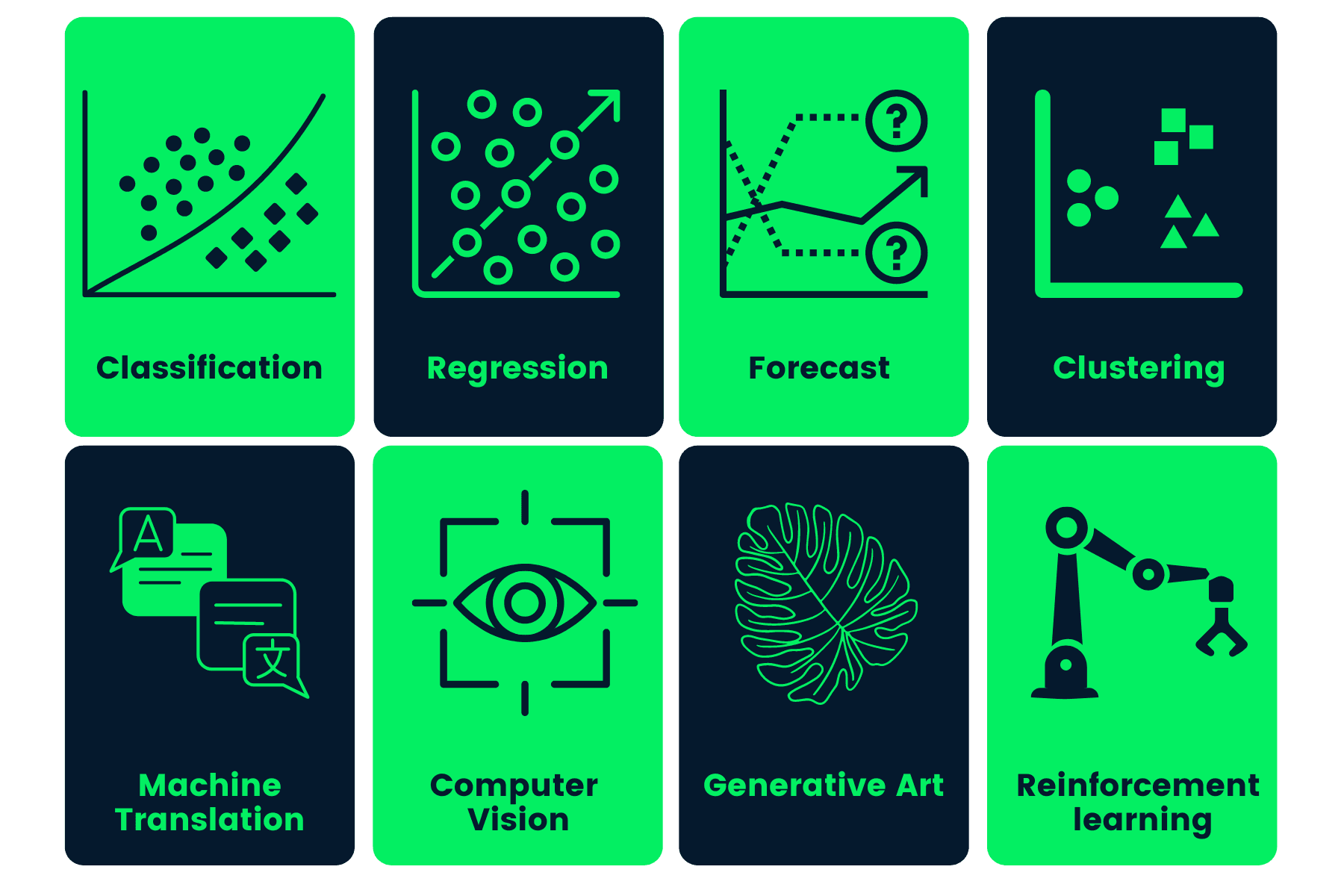All Categories
Featured
Table of Contents
- – What Does What Is A Machine Learning Engineer ...
- – How Machine Learning For Developers can Save Y...
- – Machine Learning/ai Engineer for Beginners
- – Machine Learning Is Still Too Hard For Softwa...
- – An Unbiased View of Master's Study Tracks - ...
- – Is There A Future For Software Engineers? Th...
- – Machine Learning Course - Questions
A whole lot of people will certainly disagree. You're a data researcher and what you're doing is extremely hands-on. You're a machine finding out person or what you do is extremely theoretical.
Alexey: Interesting. The method I look at this is a bit various. The means I believe regarding this is you have information scientific research and maker understanding is one of the tools there.

If you're solving an issue with data science, you don't constantly require to go and take device discovering and use it as a tool. Perhaps you can simply use that one. Santiago: I such as that, yeah.
One thing you have, I don't know what kind of tools carpenters have, say a hammer. Perhaps you have a tool established with some various hammers, this would certainly be device learning?
I like it. An information researcher to you will certainly be somebody that's qualified of making use of artificial intelligence, however is additionally efficient in doing other things. He or she can use other, various tool collections, not only artificial intelligence. Yeah, I such as that. (54:35) Alexey: I haven't seen other individuals proactively stating this.
What Does What Is A Machine Learning Engineer (Ml Engineer)? Mean?
This is exactly how I like to believe concerning this. Santiago: I have actually seen these principles utilized all over the location for various points. Alexey: We have an inquiry from Ali.
Should I begin with maker learning projects, or participate in a program? Or discover math? Santiago: What I would certainly state is if you already got coding abilities, if you currently recognize how to develop software application, there are 2 means for you to start.
How Machine Learning For Developers can Save You Time, Stress, and Money.

The Kaggle tutorial is the ideal location to start. You're not gon na miss it go to Kaggle, there's mosting likely to be a checklist of tutorials, you will understand which one to pick. If you want a little extra concept, before starting with an issue, I would certainly recommend you go and do the device discovering program in Coursera from Andrew Ang.
It's possibly one of the most preferred, if not the most popular course out there. From there, you can start jumping back and forth from troubles.
Alexey: That's a great program. I am one of those 4 million. Alexey: This is exactly how I began my occupation in device discovering by seeing that course.
The lizard publication, sequel, phase four training versions? Is that the one? Or component 4? Well, those are in guide. In training designs? So I'm uncertain. Allow me tell you this I'm not a math man. I assure you that. I am as great as math as anybody else that is bad at math.
Since, honestly, I'm unsure which one we're discussing. (57:07) Alexey: Perhaps it's a various one. There are a number of various reptile books available. (57:57) Santiago: Possibly there is a various one. This is the one that I have here and possibly there is a various one.

Maybe in that chapter is when he discusses gradient descent. Obtain the total concept you do not need to understand just how to do slope descent by hand. That's why we have collections that do that for us and we don't need to carry out training loopholes anymore by hand. That's not essential.
Machine Learning/ai Engineer for Beginners
I assume that's the best suggestion I can offer concerning math. (58:02) Alexey: Yeah. What benefited me, I bear in mind when I saw these big solutions, normally it was some linear algebra, some reproductions. For me, what aided is attempting to convert these solutions into code. When I see them in the code, recognize "OK, this frightening thing is just a number of for loops.
However at the end, it's still a number of for loops. And we, as developers, know exactly how to deal with for loops. So decaying and revealing it in code truly assists. It's not scary any longer. (58:40) Santiago: Yeah. What I try to do is, I attempt to surpass the formula by attempting to discuss it.
Machine Learning Is Still Too Hard For Software Engineers Fundamentals Explained
Not always to understand just how to do it by hand, but definitely to comprehend what's occurring and why it functions. Alexey: Yeah, many thanks. There is a question concerning your training course and concerning the link to this program.
I will additionally post your Twitter, Santiago. Anything else I should include the summary? (59:54) Santiago: No, I believe. Join me on Twitter, without a doubt. Keep tuned. I really feel happy. I feel confirmed that a great deal of individuals discover the material useful. Incidentally, by following me, you're also helping me by offering responses and telling me when something does not make feeling.
Santiago: Thank you for having me here. Particularly the one from Elena. I'm looking forward to that one.
Elena's video clip is currently the most watched video on our network. The one about "Why your equipment finding out projects fail." I think her 2nd talk will conquer the first one. I'm really looking onward to that one. Many thanks a great deal for joining us today. For sharing your expertise with us.

I really hope that we transformed the minds of some individuals, that will certainly currently go and begin solving troubles, that would certainly be truly terrific. Santiago: That's the objective. (1:01:37) Alexey: I believe that you managed to do this. I'm pretty sure that after ending up today's talk, a couple of individuals will certainly go and, rather of concentrating on mathematics, they'll take place Kaggle, find this tutorial, create a decision tree and they will quit hesitating.
An Unbiased View of Master's Study Tracks - Duke Electrical & Computer ...
Alexey: Thanks, Santiago. Here are some of the key responsibilities that define their duty: Equipment discovering engineers usually work together with information researchers to gather and tidy information. This procedure involves data extraction, change, and cleaning up to ensure it is ideal for training maker learning versions.
When a version is trained and validated, engineers deploy it right into production atmospheres, making it accessible to end-users. This involves integrating the design right into software systems or applications. Maker knowing models require recurring monitoring to execute as expected in real-world circumstances. Designers are accountable for detecting and dealing with issues quickly.
Here are the important abilities and credentials required for this role: 1. Educational Background: A bachelor's degree in computer system science, math, or an associated area is often the minimum demand. Several machine learning engineers also hold master's or Ph. D. degrees in appropriate self-controls.
Is There A Future For Software Engineers? The Impact Of Ai ... Can Be Fun For Everyone
Ethical and Legal Awareness: Recognition of honest considerations and legal implications of device understanding applications, consisting of data privacy and prejudice. Adaptability: Staying present with the quickly advancing field of maker discovering through continual discovering and specialist development.
An occupation in artificial intelligence uses the opportunity to work on sophisticated technologies, resolve intricate problems, and dramatically influence numerous markets. As artificial intelligence remains to progress and permeate various markets, the demand for experienced maker discovering designers is anticipated to grow. The function of a maker learning engineer is critical in the period of data-driven decision-making and automation.
As modern technology developments, equipment knowing designers will drive development and produce remedies that profit society. If you have a passion for information, a love for coding, and a hunger for fixing intricate troubles, a profession in machine understanding may be the ideal fit for you.
Machine Learning Course - Questions

AI and machine learning are expected to develop millions of new work possibilities within the coming years., or Python shows and get in right into a brand-new field complete of prospective, both currently and in the future, taking on the obstacle of finding out device knowing will obtain you there.
Table of Contents
- – What Does What Is A Machine Learning Engineer ...
- – How Machine Learning For Developers can Save Y...
- – Machine Learning/ai Engineer for Beginners
- – Machine Learning Is Still Too Hard For Softwa...
- – An Unbiased View of Master's Study Tracks - ...
- – Is There A Future For Software Engineers? Th...
- – Machine Learning Course - Questions
Latest Posts
How To Self-study For A Faang Software Engineer Interview
How To Break Down A Coding Problem In A Software Engineering Interview
Software Developer (Sde) Interview & Placement Guide – How To Stand Out
More
Latest Posts
How To Self-study For A Faang Software Engineer Interview
How To Break Down A Coding Problem In A Software Engineering Interview
Software Developer (Sde) Interview & Placement Guide – How To Stand Out